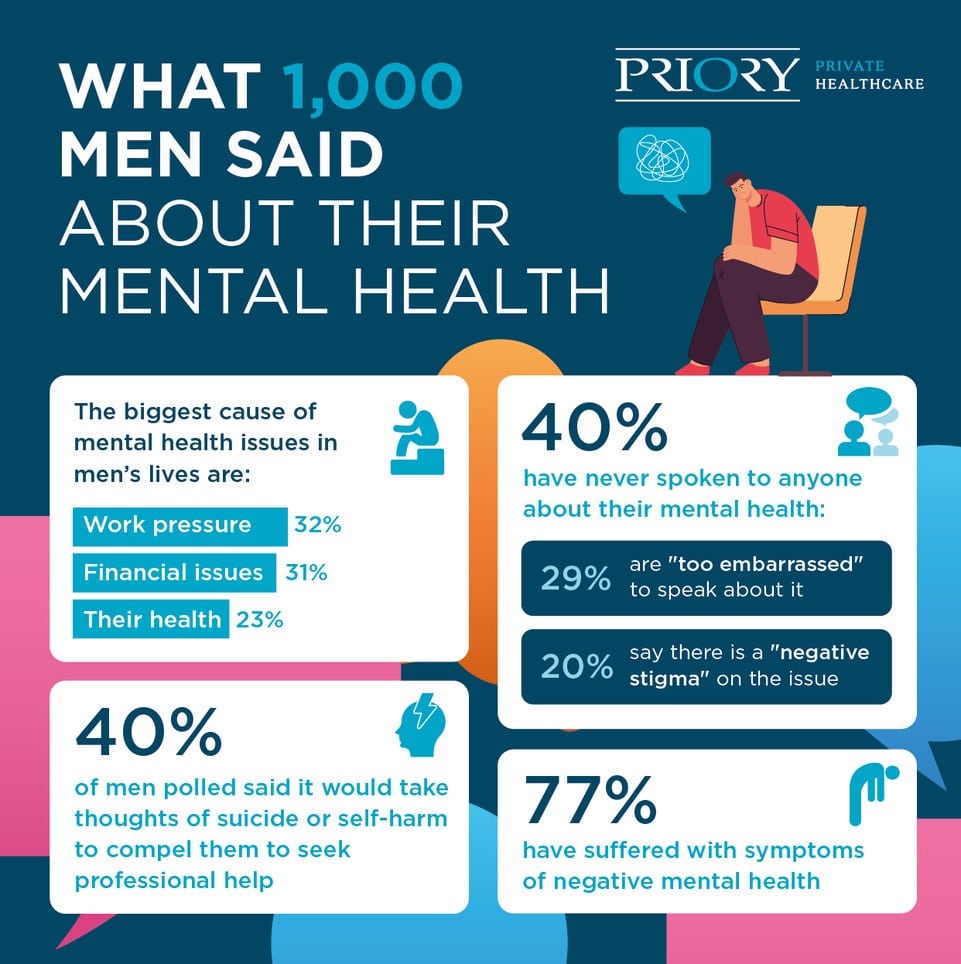Men's mental health: 40% of men won’t talk to anyone about their mental health
Key statistics related to men's mental health and the biggest challenges facing men and their mental health.
Key statistics related to men's mental health and the biggest challenges facing men and their mental health.


Mental health statistics show that over a third of men (35%) think they've had a diagnosable mental health condition at some point in their life. To get a better understanding of how men think and interact with their mental health, Priory commissioned a survey of 1,000 men in the UK.
In the survey, we asked men:
The majority of men (60%) polled have shared their feelings about mental health with someone at some point. This leaves as many as 4 in 10 (40%) men in the UK who won't discuss their mental health with close friends, family, or a medical professional.
Alarmingly, the survey highlighted that for 40% of men, it would take thoughts of suicide or self-harm to compel them to get professional help.
Note: if you know someone who's in need of immediate help, consider these crisis support options.
When men do choose to speak up, the results showed that 66% would share their feelings with their partner above anyone else.
For the men who said they don't talk to anyone about their mental health, their underlying reasons were:
Even when related to medical professionals like their GP, many men don't feel like they can raise the issue of mental health. Almost one quarter (22%) of respondents said they would not feel comfortable speaking to their GP or any other professional about their mental health. The main reason given was that they worry it would be a waste of their GP’s time. Given that suicides are so high amongst men (77% of all suicides are completed by men), it serves to highlight the damage that can be caused when men feel like they can't reach out for support.

The results show that work still needs to be done to lift the stigma that surrounds mental health. Dr Natasha Bijlani, Consultant Psychiatrist at Priory Hospital Roehampton, puts it down to the outdated idea of what it means to be a man:
“Traditionally, men have been less likely to seek support for mental health issues. This is probably for a number of reasons, including stigma and the traditional ‘strong male’ stereotype still prevalent in our society – the idea that expressing emotion is a sign of weakness."
77% of men polled said they experienced some level of symptoms for common mental health problems such as anxiety, stress or depression.
But what underlying factors are driving those symptoms? Respondents were asked about the biggest causes of pressure in their life - pressures that might negatively impact their mental health.
The top three issues were:
The seasonal pressure of Christmas was also mentioned as a factor, especially among men aged 35 to 44. The cost of the festive season means Christmas and mental health don't always match up as harmoniously as we believe - especially for people with young children or bigger families.
In many cases, men and women don’t differ in the signs of mental health struggles they experience. If you're concerned that you or someone else might be suffering from mental health issues, consider these common signs and symptoms:
While many of these symptoms are universal, some signs are more common in men than they are in women. Examples include:
If you're struggling with symptoms of mental health issues, know that there are things you can do that can help you get back on track.
Making small adjustments to your lifestyle can have a huge impact on how you feel day-to-day. Experiment with some of these ideas to make improvements to your mood and slowly feel a whole lot better:
You might think you're alone in your struggles against mental health, but actually, it's likely that you've got a whole support network of people around you who can see something is wrong. If you feel up to it, speak up about how you've been feeling. A sympathetic ear is sometimes all we need to feel a whole lot better. They might even be able to offer practical solutions to help you work out what's next.
If you've had persistent symptoms of a mental health problem for weeks or even months, it's time to reach out for professional support. Your GP is a great place to start. They're able to diagnose a condition if they find one, and can offer expert advice on potential treatment options. Remember, a GP's passion is to help people feel better - don't feel like you're burdening them by speaking up about how you've been feeling.
Many effective treatments for mental health issues exist today, allowing people to make a full and lasting recovery. Examples include:
